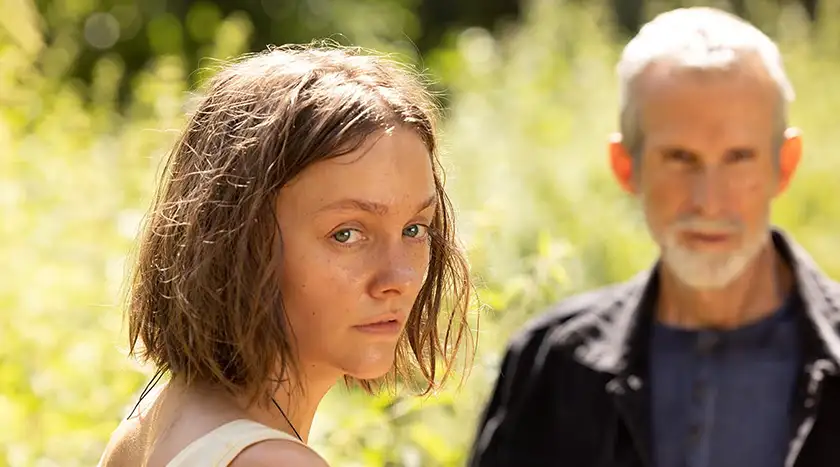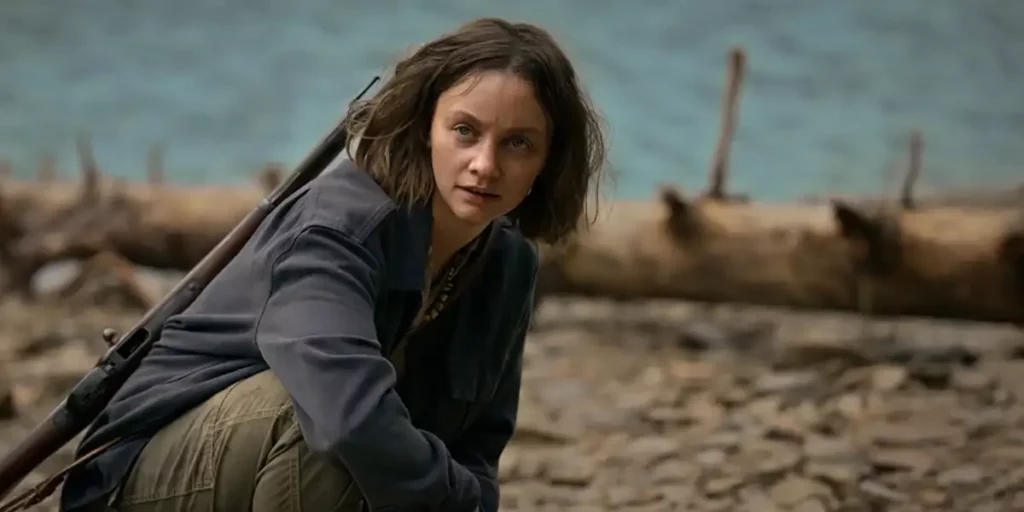Sophia Bösch’s Milk Teeth is an intriguing, atmospheric and eerie tale of ostracisation and superstition that looks and sounds fantastic.
There’s an uneasy, eerily unnatural haze of fear and suspicion often imbued into the woods. So many folklores and fairytales have the monsters call the forest their home, that it’s easy to see why, as a setting, it completely works for Sophia Bösch’s Milk Teeth (Milchzähne). It is a film about mistrusting the ‘other’, and content to prioritise creeping tension and subtlety over obvious thrills. But it remains thrilling all the same and is an astonishing debut.
Within a rural forest community, the arrival of mysterious young girl Meisis (Viola Hinz) coincides with the disappearance of local children and the unexplained deaths of livestock. While the locals are immediately suspicious, accusing her of being something supernatural and to be fearful of, Skalde (Mathilde Bundschuh) and her mother Edith (Susanne Wolff) bring her into their home. But as the anger and fear from the community grows even more oppressive, Skalde must decide whether she wants to fight for their place there or retreat outside the confines of the village.
Bösch’s film feels embedded in the forest, so entwined is it with the mystical nature of the woods. Folkloric stories of ‘wolf children’ who abduct humans and take their place in the community have the locals rigid with fear and superstition. They arm themselves every time they venture into the woods to forage for food, and are so blinded by their belief in these fairytales that they’ve become suspicious and small minded. Even to the point that they still consider Edith, who has lived within the village for almost two decades, an ‘outsider’ and a ‘witch’.
And it’s in that system of thinking, that ostracisation of ‘otherness’, where the bulk of Milk Teeth’s drama comes from. The film explores the dangers of not conforming, in particular it questions how society treats those with their own agency within a vaguely post-apocalyptic community that has retreated inwards. Alongside Edith, life partners Gösta (Karin Neuhäuser) and Len (Walfriede Schmitt) are also kept at the fringes of society. They do not appear to fit within the locals’ perceived notion of what is right or natural, and are summarily shunned. Skalve has always been desperate to fit in, but her fondness for Meisis clashes with the town’s insular thinking, and she starts to question whether the village is truly where they belong. After all, voluntary ostracism may well be far less dangerous than the righteousness of scared believers.

There’s an uneasy tension throughout the whole film, and Bösch builds it so effectively. Visually, Milk Teeth is really striking, with a peculiar beauty and haziness that really echoes the folkloric aspect of its narrative. Aleksandra Medianikova’s cinematography really captures the intriguing nature of the world being built here, lingering on the details of the forest and slowly creeping through the undergrowth. And the film sounds incredible too, with Gina Keller’s sound design focusing on the eerie, almost ethereal diegetic sounds of the forest to create something that feels really otherworldly.
Milk Teeth is an absorbing film that very effectively balances having style and substance. There’s so much to be interested by, and it’s all bolstered by the fact that it looks and sounds wonderful too. It’s incredibly atmospheric, and the subtle way Bösch explores the nature of being seen as a pariah for daring to be ‘other’ is really interesting. The fact that it isn’t concerned with explaining itself, offering easy answers or explanations, adds to the experience, and it’s a fascinating way of exploring the confining nature of fervour and fear, the wariness of the ‘other’ and the importance of agency.
Milk Teeth was screened at the Glasgow Film Festival on 4-5 March, 2024. Read our Glasgow Film Festival reviews and our list of films to watch at the 2024 Glasgow Film Festival!

